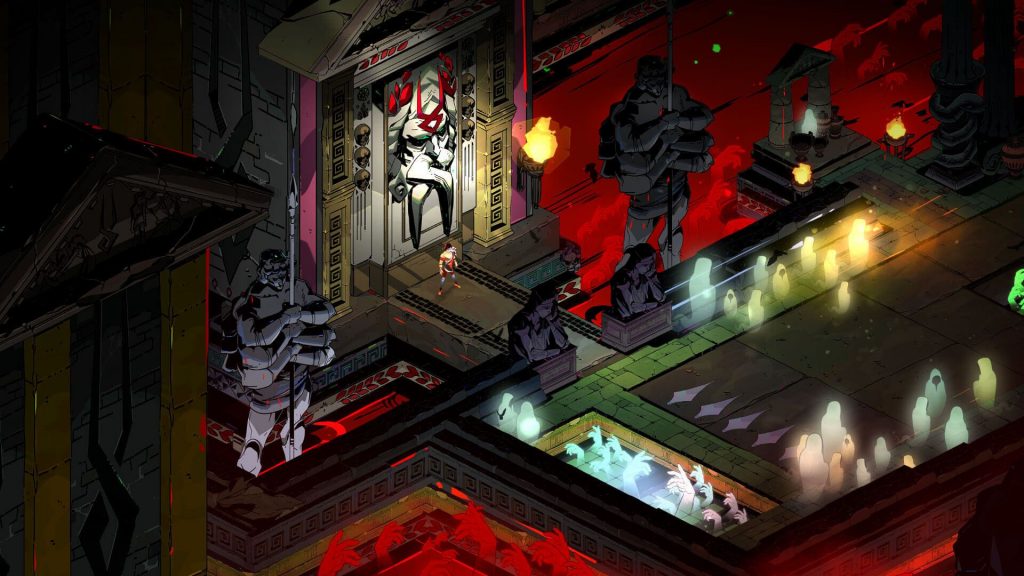Zagreus is on a mission. The unwavering pessimism and isolatory chambers of his homeland have proven too much for the young prince, causing him to forge a new path to Olympus – even if it means leaving the Underworld that raised him behind. The opening moments of Supergiant’s Hades don’t immediately provide this context, with the player being given full control as they battle through a sequence of rooms with only the most basic of abilities. This first run could see you escape if you’re good enough, but it isn’t meant to be. Our hero is destined to return to the realm of the undead again and again, only to be pestered and belittled by his father while a few unexpected allies cheer him on from the sidelines.
I’m disgustingly late to the party on this one, but I started Hades for the first time this week, and its introduction is one of the most striking and memorable in recent memory. It isn’t punctuated by an explosive action sequence or a huge narrative revelation, but is instead just another attempt of Zagreus trying to escape the underworld. He fails, and as he emerges from the crimson lake with his luscious body coated in blood, we see his humble abode for the first time. It’s in ruin, a lack of care leading to dusty carpets, scuffed walls, and general disarray. Its inhabitants exist in a perpetual state of aloofness. It’s ironic then, that as Zagreus seeks to leave this place behind, he inadvertently begins to bring it all back to life.
Related: NEO – The World Ends With You Review
Until a handful of runs have been completed, the hub world is deliberately sparse. Hypnos makes playful jabs about each passing death, while Achilles offers valuable insight into the role of a warrior and the value of history. Hades is merely there to mock you, but even his insights feel lined with a slither of warmth that comes with family, that part of him is sad to see Zagreus so eager to leave his former life behind. While he’s looked down upon, Zagreus remains welcome in the Underworld, encouraged to leave his conquest behind and find comfort in the life that’s been given to him. But as the true nature of his lineage comes to light, this bargain becomes increasingly difficult to comprehend. Within only a couple of hours, Supergiant has created a world with endless potential that I already adore.
I suppose when your lead character is cursed with immortality, the personalities around him can only wish them a certain level of ire, and it's through this perspective that connections are formed between Zagreus and the Underworld. My colleagues were shocked to hear I managed to reach the Hydra on my second run, but I’m glad it managed to conquer me. My untimely demise meant I was able to take things slow, watching the Underworld evolve before my very eyes as new rooms opened up to me and additional characters began filling in the cracks left behind by my progress. Dusa and Megaera are definite favourites thus far. They’re polar opposites – one is an adorably shy gorgon while the other is a scornful fury with a bone to pick with Zagreus. While my time in this world has only just begun, it’s clear there’s a history here that began long before I picked up the controller.
Zagreus has spent his life here, so it makes perfect sense that he’d feel an untouchable bond between the people, places, and culture despite his willingness to abandon it in favour of a better life. I still don’t know the reasons behind his motivation, only fed small pockets of information through dialogue exchanges between fellow gods and relatives. I assume this drip feeding of lore is deliberate, allowing the player to discover the narrative on their own terms in a manner that directly subverts the nature of the genre. Roguelites are designed to take things away upon death, but Hades seems to never stop giving and encourages you to keep pushing forward. It’s masterful, and seeing everyone respond to my unwavering determination to reach Olympus in spite of myself seems to possess a constant stream of rewards.
After a couple of hours, the Underworld still feels like a shadow of its former self, fluorescent decor and morbidly gorgeous views doing little to alleviate the aura of abandonment that punctuates its halls. Zagreus seeks a greater purpose, an existence away from a world defined by pestilence and death, and I sympathise with his journey. However, the emotional bonds I’m beginning to form with his friends and family will make it hard to say goodbye, especially once I stumble upon the romantic relationships I’ve heard so much about. I’ll be real, my knowledge of Hades comes entirely from fan art, so it’s almost bizarre to finally absorb everything from the game itself instead of via a weird thirsty osmosis for Zagreus and Thanatos. I’ve got so much to look forward to in Hades, and I can’t wait to finally see it.
Next: Greg Kasavin On The Success of Hades, Diversity In The Pantheon, And Zagreus In Smash
